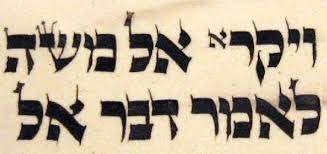Last week we finished reading the Book of Exodus and this week we begin with the third book of the Torah – Leviticus. Tomorrow’s “parasha” (weekly Torah portion) is “Va-yikra” {ויקרא} – which is the first “parasha” in the Book of Leviticus and found in Leviticus 1:1–5:26. This “parasha” talks mainly about the laws of the sacrifices in the Tabernacle and later on in the Temple in Jerusalem.
The Hebrew name of the weekly Torah portion means ‘and he called’ (“Va-yikra”). One cannot see that in the English translation but in the original Hebrew the last letter of this Hebrew word (the letter ‘Alef’ {א}) is smaller than the usual and when reading the Torah in the original Hebrew it stands out.

Many Bible commentators tried to find an answer for this very unique phenomenon that can only be found in very few other places in the whole Hebrew Bible. One of the more interesting interpretations pointed out the difference between Moses and Balaam which according to this interpretation can be seen by comparing the two Hebrew verbs that were used to describe the way God spoke to both of them: In the case of Balaam it is written ‘Ya-yikar’ {ויקר} (Numbers 23:4) – missing the Hebrew letter ‘Alef’ and creates a new meaning ‘and he met’ instead of Moses’ case ‘Va-yikra’ {ויקרא} (‘and he called’).
The main difference, according to this interpretation, is that while Moses was ‘called’ by God from the Tabernacle – suggesting a strong and steady connection – in the case of Balaam the encounter with God only happened one time and had a completely different nature.
